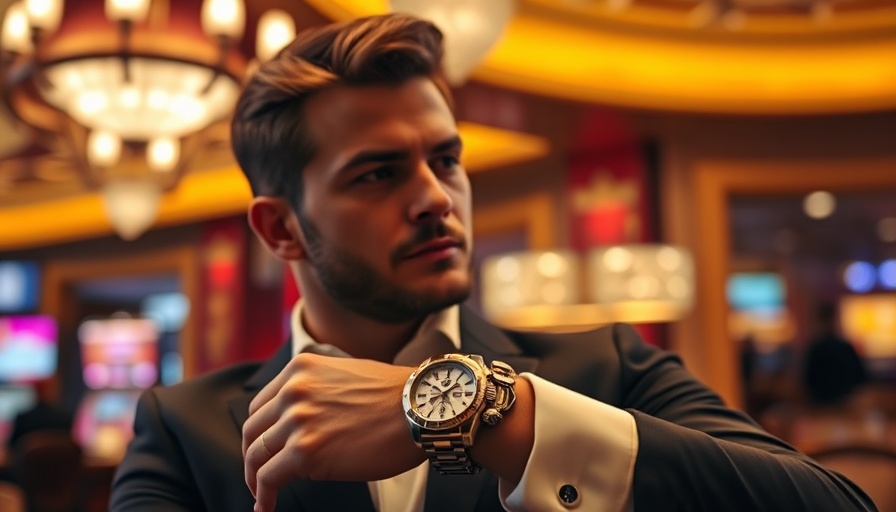
Understanding the Psychology Behind Luxury Brands
In today's consumer-driven marketplace, luxury brands wield a unique power: they create an allure that transcends mere products and taps into the aspirations of consumers. Luxury brands employ sophisticated marketing strategies designed to evoke emotions tied to desire, exclusivity, and status. Through celebrity endorsements and lifestyle integration, they successfully cultivate a desire for ownership among consumers.
In 'How Luxury Brands Brainwash You to Buy', the discussion delves into the sophisticated marketing strategies luxury brands use to entice consumers, prompting an exploration of these insights and their application in broader marketing contexts.
The Influence of Celebrity Endorsements
Brands like Louis Vuitton leverage prominent public figures—celebrities, athletes, and social media influencers—to elevate their status and desirability. This phenomenon isn’t random; it’s a calculated move. When a beloved celebrity is seen sporting a luxury item, it creates a ripple effect, instilling a sense of aspiration among fans. The question is: what compels us to follow suit? It boils down to perceived prestige and social proof. We tend to admire and emulate those we look up to, and when these individuals showcase a luxury brand, it implicitly signals that the product is synonymous with success and high status.
Luxury Brands and Exclusive Experiences
Beyond mere products, luxury brands entwine themselves with exclusive experiences. For example, Louis Vuitton's association with yachting—a pursuit seen as a status symbol—connects their brand with a lifestyle of affluence. By intertwining exclusive hobbies or events with their products, they create an aspirational narrative that fuels consumer desire. This leads to the understanding that luxury is more than a possession; it’s a lifestyle to be experienced.
The Power of Brand Storytelling
In the realm of marketing, narrative is everything. Luxury brands excel at storytelling, conveying how their products symbolize not just wealth, but personal identity and extraordinary experiences. This narrative is critical as it cultivates emotional connections with consumers. Effective storytelling also becomes a pivotal element of content marketing strategies for luxury brands, as it helps encapsulate the values and characteristics that define the brand itself.
Capitalizing on Digital Marketing Trends
As technology develops, luxury brands adapt to new avenues such as influencer marketing and social media ads. Platforms like Instagram offer a compelling avenue for reaching target demographics, particularly millennials and Gen Z. Through strategic partnerships with influencers who align with the brand’s image, these companies can broaden their reach while maintaining an aura of exclusivity and elegance. Digital marketing metrics have increasingly become a focal point in evaluating marketing success, enabling brands to optimize their strategies accordingly.
The Role of Inbound Marketing in Luxury Branding
Inbound marketing strategies contribute to the branding operations of luxury companies. By creating content that resonates with users and engages them authentically, brands can foster a genuine connection. Effective content marketing practices, from blog posts to videos, play a significant role in shaping customer perceptions and driving engagement. Brands can harness these tools to become storytellers that draw customers into their world.
Future Trends: The Rising Role of AI and Data-Driven Marketing
The luxury retail space is undergoing a data revolution. With AI tools and marketing analytics, brands can tailor experiences for customers in real-time. Predictive analytics can help identify consumer behaviors and preferences, allowing for hyper-personalized marketing efforts. As more brands embrace machine learning to analyze user data, the effectiveness of campaigns will only improve, reinforcing the brand's connection to the customer’s journey.
Final Thoughts: Recognizing Marketing Influence
As professionals, business owners, and marketers, it’s crucial to recognize the underlying mechanisms at play in luxury branding. The strategies discussed here reveal how luxury brands leverage a blend of psychological, emotional, and digital tactics to connect with their audience. Understanding these strategies not only enhances our appreciation for luxury branding but can also provide actionable strategies for our own marketing efforts.
In closing, consider the implications of what you, as a consumer, value in luxury marketing. Recognizing the influencing factors can shape your own marketing strategies, whether you're building a brand, engaging with audiences on social media, or enhancing your content marketing efforts.
 Add Row
Add Row  Add
Add 




Write A Comment